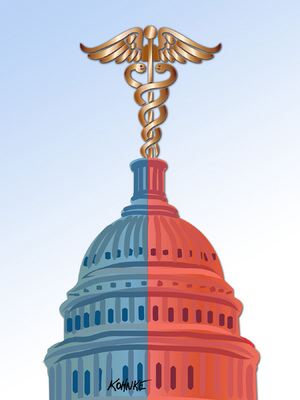
The ongoing health-care debate in Congress
(c) Jennifer Kohnke
The details are still fuzzy, but many of the features have come into focu
This may feel like just another open enrollment season, one more anxious check of the coverage offered by your employer to see how much benefits have been trimmed and the financial pain heightened. But before long, at least the worry that vital coverage will be lopped off could end. After health reform, a few years from now, nearly all Americans would be required to have coverage--at a minimum, a "qualified" health plan, designed to Uncle Sam's specifications and providing a core of comprehensive protection.
Most likely, you'd get hospitalization, emergency services, rehabilitation, prescriptions, mental-health and substance-abuse services, maternity care, and well-child services. Preventive care recommended under medical practice guidelines, such as vaccinations, abdominal aortic aneurysm screening in men ages 65 to 75 with a history of smoking, and mammograms every one to two years for women starting at age 40, would be covered.
Basic qualifying plans would be grouped into tiers based on how costs are shared between plan and member. A bottom-tier plan would offer the lowest premiums, but copayments would be higher, and the insurer would pay less of the bill. Healthier people who expect to use fewer services might find such a plan appealing. A top-tier plan would have higher premiums, but members would pay less for care. Here are other key elements, distilled from the legislation in play in early November, that are likely to appear in health plans of the future:
Guaranteed coverage
In the new world order, you couldn't be kicked out of a plan if your health changed, and a pre-existing condition could no longer give cause for rejecting coverage of care-related expenses or blocking your insurance eligibility. "In today's market, people are denied insurance because they [heeded] the advice of a doctor and took a pill to lower their cholesterol," says
Everybody plays
A majority of uninsured Americans, now put at 46 million, would be ushered under the health insurance umbrella. Many have stayed out by preference, taking their chances on staying healthy, but others have been kept out because of health issues; now joining up would be mandatory. Individuals without access to employer-based coverage would have to buy a policy at a new "exchange" from a private insurer or potentially--the proposed public option--from the government. Information in your tax return would tell Uncle Sam whether you were on board. If not, you'd probably pay a fine--possibly a flat fee of, say,
No push to switch
You wouldn't be forced to abandon your current employer plan, but if it didn't meet the "qualified plan" standards--most plans, even at companies of modest size, probably do already--the company would have to create a new plan that did. The old plan would be permitted to continue, possibly only for a certain number of years, in a frozen state, with no changes. With a new plan, says
Age-based premiums
Currently, premiums for plans sold to individuals often are calculated not only according to age, health status, and pre-existing conditions but on gender, credit rating, employment history, and other personal information as well, says
Financial aid
For those who shop on the exchange, a federal subsidy would cap premiums for households with incomes up to four times the poverty level, currently about
Fewer catastrophic policies
As plans change to meet the more comprehensive baseline coverage, the current combination of relatively cheap policies that kick in only for financially catastrophic events, such as advanced emergency room care or unexpected surgery, plus individual health savings accounts might outlive its usefulness. "I suspect the days of the [high] deductible would be numbered," says
- There's No Place Like Home: Elderly Qualify for Wide Range of Services
- The 'Reform' That Ate America
- Congress Needs to Improve Quality of Healthcare
- Medicare Advantage Trims Could Affect Millions of Seniors
- Congress Fights Obesity With Healthcare Bills
- Why Americans Should Not Fear Scientific Progress
- Is a 'Cash Only' or 'Direct Pay' Doctor Right for You
- Even if health care insurance worries end soon work as engaged informed patients just beginning
- Healthcare Reform and Patient Choice
Healthcare Industry jobs
Find your next job in the Healthcare Industry. Search Healthcare jobs from thousands of job and career search sites.
Healthcare - Your Future Health Plan: When health reform dust settles few Americans will be unaffected
(c) 2009 U.S. News & World Report
